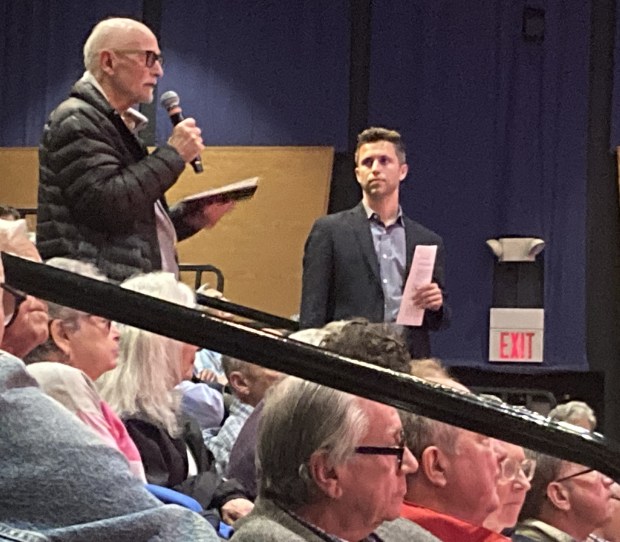Questioners at a town hall hosted by U.S. Rep. Brad Schneider, D-Highland Park, wanted to know what he did, and plans to do, about cuts to services and other actions by the Republican majority in Congress pushing the agenda of President Donald Trump.
Democrats brought 500 amendments to the legislation dubbed Trump’s “Big, Beautiful Bill” last week, knowing they would be voted down, but Schneider said that may eventually get some Republicans to cross party lines and slow the momentum of the president’s agenda.
“We can slow it down,” he said. “They have this idea of flood the zone. I don’t get the chance to score any points. We can’t let this be normal. We can’t accept it as normal.”
Schneider updated a crowd of more than 200 people about the impact of Trump’s legislation now in the U.S. Senate, discussed the effect of tariffs on businesses, answered dozens of questions and explained the methodology of the 500 amendments at a town hall Tuesday in Northbrook.
Knowing there was little chance any of the amendments Schneider and his colleagues proposed would pass, he said they were targeted at specific Republicans who represent swing districts, like U;S. Rep. Mike Carey, R-Ohio, and U.S. Rep. Brian Fitzpatrick, R-Pennsylvania.
Both Carey and Fitzpatrick sit on the House Committee on Ways and Means with Schneider. Schneider said some of the amendments were meant to force them to take a position that is unpopular with the people they represent.
“We wanted to force Republicans to vote on the amendments,” he said. “The amendments were tailored to what’s important in their district, so they have to go home and explain why they voted against something, making them own the votes they take.”
Either representatives like Fitzpatrick and Carey will cross party lines on some votes, or there will be campaign ads next year letting voters in their districts know about votes on legislation that led to cuts in programs like Medicaid.
“We need to get people to understand what some of these guys are saying and doing in Washington is not what they’re doing and saying at home,” Schneider said.
People like Art Schwank of Lincolnshire said the actions of Trump and Republican members of Congress are scary. He talked about the speed Trump’s executive orders are making changes he considers unhealthy.
“This is out of control,” Schwank said. “They’re playing with firecrackers and dynamite, and they don’t know what they’re doing.”
Along with forcing Republicans in swing districts to be more responsive to their constituents, Schneider said shifting public sentiment will go a long way toward bringing changes, if not immediately, by the 2026 election.
“Paraphrasing Abraham Lincoln, public sentiment is everything,” Schneider said. “With it, you can do anything. Without it, nothing is possible. If we can sway public opinion, first it will slow it down, and ultimately it can flip. The key thing for me is flipping the House.
Some people asked what can be done now, before the 2026 election when 435 representatives to Congress will be elected once again. Schneider said more of his colleagues need to act like U.S. Rep Don Bacon, R-Nebraska, who was critical of Trump’s stance on the war in Ukraine.
“I just need five Republicans,” Schneider said. “I don’t need them to become Democrats. I need them to stand up against what this administration is trying to do in undercutting the Constitution. I can point to a number of people who should be willing to step out and step forward.”
Several people questioned Schneider on Trump’s imposition of tariffs and their impact. Schneider said Congress needs to reclaim its constitutional duty to impose tariffs, which the president must enforce.
“A number of us have introduced a series of bills that will reestablish the responsibility for tariffs rests with Congress,” he said. “We are the ones who establish those tariffs. It’s not up to the president to decide tariffs on Friday, and on Sunday draw those tariffs back.”
Schneider said the uncertainty of the tariffs is making it hard for small and medium-sized businesses in Lake County to plan, for manufacturers to decide what raw materials to purchase and when, as well as for retailers to order the goods now they intend to sell during the holiday season.
“What these companies have to do is decide what to bring in for manufacturing a month from now,” Schneider said. “Those tariffs are really hard on them.”





